Game of Thrones: A World Without Rules and Why We're Fascinated

The seventh and final year of Game of Thrones began last week on HBO. It is one of the most widely viewed shows on television ever, and a reported 16 million viewers watched it last week. My wife and I have largely ignored this phenomenon up until now, but last month my wife dipped her toe in and got hauled into the show with whips and chains. She is now binge watching the show to catch up to where it is now. I miss her.
I thought, well, maybe I ought to go into the TV room to see what it was all about. And so I did. It’s about people chopping off each other’s heads, gangs of barbarians at the gates of kingdoms and one particular handsome blond woman who looks straight ahead and, if she doesn’t like the way things are going, summons one or two of her giant flying dragons to the rescue. They have wingspans about the same as a Boeing 747 and they breathe fire, but they look to her with beady-eyed love and will do what she tells them. There is no law and order. There are dragons.
“How did she get those dragons?” I asked my wife.
“I don’t know. I think she had something to do with sheltering the eggs or something.”
People say the attraction of this show is that you know you shouldn’t get too attached to a good person or a bad person because they all die at the hands of others. They say the quality of the production, movie quality, is the attraction. They say there’s a plot that moves along smartly and that’s the attraction.

I say it is all about the appeal to our primitive brains. It was not so long ago that television had right and wrong and good people and bad people and the good guys won. In those days, we had the Ten Commandments to guide us. And in our rational brains we knew right from wrong. I think the Harry Potter series was appreciated for those reasons. You might have felt affection for the bad guys. Bonnie and Clyde comes to mind. But you knew that in the end a Judeo-Christian society that distinguished between right and wrong would prevail, as it should.
Our primitive brains really don’t care. They just urge us to get what we want. Forget right and wrong.
These days, the primitive brain is in the ascendant. People shoot people in schools, fast food joints, business cafeterias and schoolyards. Radical Islam not only encourages violence against non-radical folks but offers solace and a trip to paradise to those that carry it out.
Going to church on Sundays, here in America, at least to Christian church, is in decline. We have been a gentle, caring, kind people. And we have carefully held our primitive brains at bay.
You think this is a stretch?
A perfect example of these two approaches to life can be seen in the history of the Hamptons.
The legend is that the East End was settled by Puritans who made peace with the Indians by inviting them to have Thanksgiving with them. Love prevailed. This is not true.
The truth is, there were two kinds of white settlers. One was peace-loving and in harmony with a gentle God. These were the English churchgoers, people of discipline following the loving and hard-working Christian way of life.
The others were the Puritans. They were the radical fundamentalists of their day, believing in heaven and hell, a strict interpretation of the Bible and crime and punishment. Suffering persecution in England, they fled to America.
Both kinds crossed Long Island Sound to settle on Long Island beginning in 1639. Our first settler was Lion Gardiner, of the first group. He was a fort builder hired by the King to come to America and build a fort at Old Saybrook, Connecticut to protect that settlement from the savage Pequot Indians. These Indians were massacring not only the white settlers but also the Narragansetts and Mohicans.
When that war concluded with the murder of all the Pequots that could be rounded up, Lion Gardiner and his wife, children and servants sailed across Long Island Sound to settle East Hampton. A similar group of people came from Lynn, Massachusetts the following year to settle in Southampton.
Churches were founded. Some of them had preachers from that second group who sermonized about fire and brimstone, devils and witches. “A man or a woman who is a medium or a necromancer shall surely be put to death. They shall be stoned with stones; their blood shall be upon them.”—Leviticus 20:27. Other ministers preached love thy neighbor.
In February of 1658, the 15-year-old daughter of Lion Gardiner, Elizabeth, fell sick and took to her bed. There, running a high fever, she screamed “a witch, a witch, now you are come to torture me because I spoke two or three words against you.” Lion Gardiner was called. “What do you see?” “A black thing, at the foot of my bed.” She said it was a local woman named Goody Garlick. Then young Elizabeth died.
Goody Garlick was brought to a tribunal of three East Hampton magistrates. Citizens testified she was an awful person, had put curses on others, had held a baby and afterwards it died, and had sent off animals to do her bidding. She was possessed by the devil and should be put to death.
The tribunal decided that this was too important a matter for their court. Instead, they decided Garlick should be taken to Hartford, Connecticut (eastern Long Island was a part of Connecticut in those years) and be tried there. A week later, the Connecticut court found her innocent and she was released. Nevertheless, she was so fiercely shunned in East Hampton that she and her husband were taken to Gardiner’s Island off the coast of Amagansett to be part of Gardiner’s estate there. She lived to a ripe old age there, a shrew perhaps, but not a witch.
During the latter half of the 1600s, more than 40 women in the Northeast were declared witches and murdered for this crime. In the year 1693, 20 of them were executed in Salem, Massachusetts. After that, the rational, loving and caring side of people became ascendant.
An interesting comparison to Goody Garlick’s story is the story of Fish Hook Mulford. In 1704 he became part of an East Hampton protest against the King’s order to tax whale oil. He went to London to state his case and made a rational, impassioned speech before Parliament. In his pockets were fishhooks. He’d heard there were pickpockets in London. He was taking no chances.
Nothing came of Mulford’s appeal to Parliament, although Parliament members said they were amused to be addressed by a rough hewn fisherman from the colonies. But Mulford’s speech was about right and wrong and fairness—the essence of levelheaded Judeo-Christian thinking at work.
America is fascinated by Game of Thrones because everyone—the rich, the poor, the priests and the kings—eventually get theirs because there is just greed and evil in the world, and no sense of ethics or right and wrong. The show is a chalkboard lesson on what is going on in the world today.
By the way, you may have wondered about the photo that accompanies this account. It is not Photoshopped. My wife and I got to tour the set of Game of Thrones, thanks to the kindness of some friends of ours who are involved in its production. The set is inside a very large film studio in Belfast, Northern Ireland, an appropriate location when you consider that the Irish people come from both a Christian and primitive background of elves, ghosts and druids.
Yes, I sat in the throne and issued orders. Nobody followed them.



